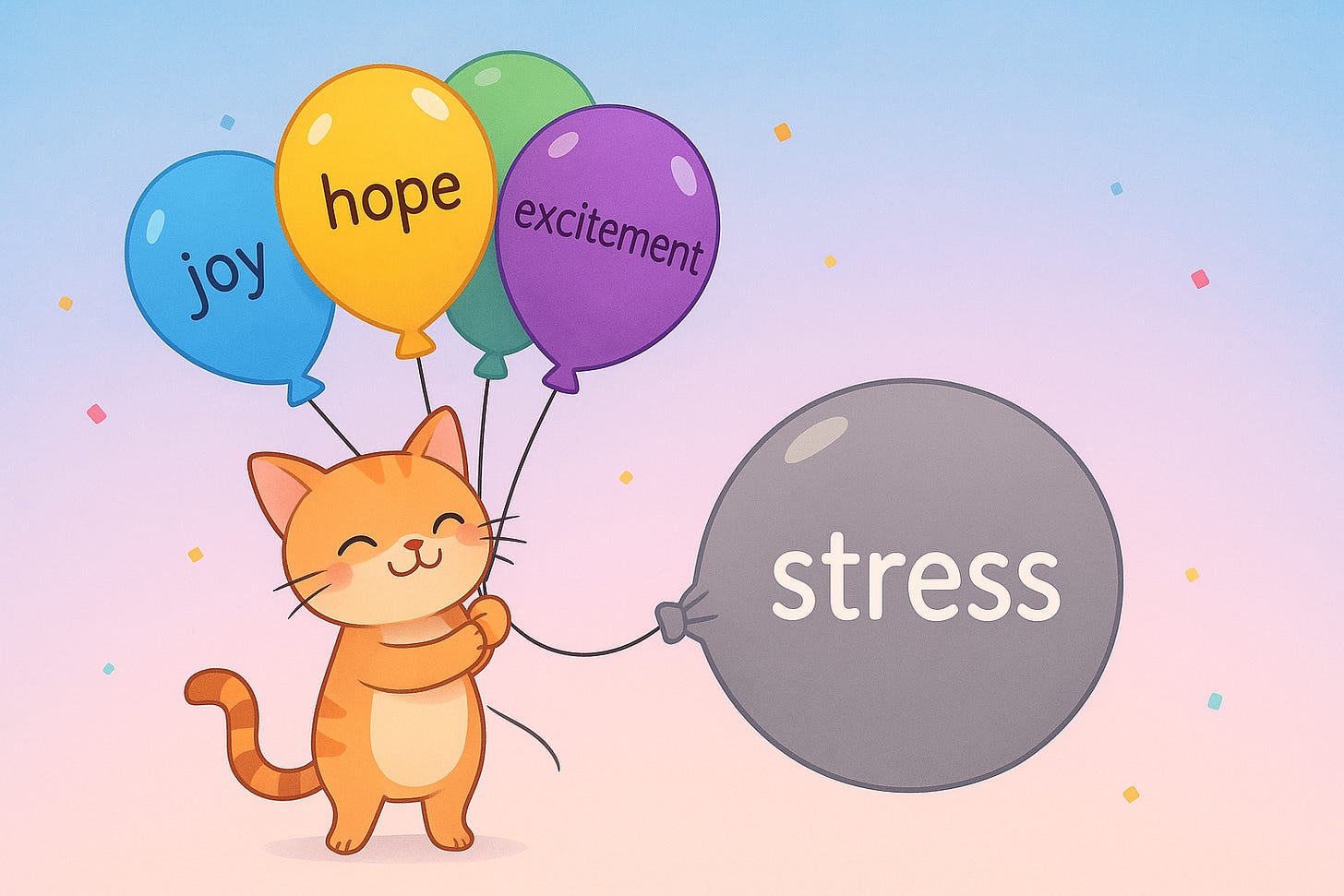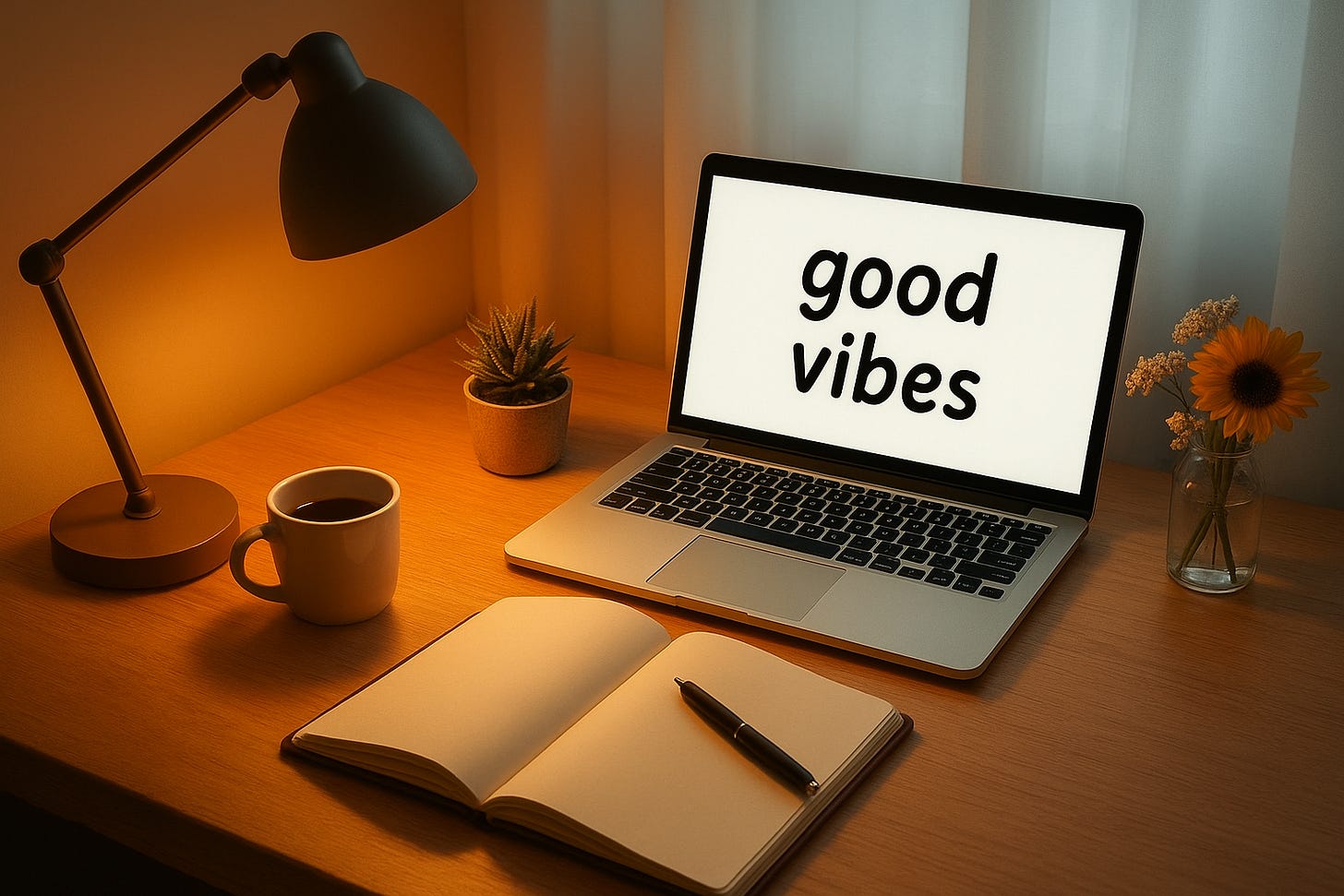When Positivity Starts to Feel Like Pressure
Why forced cheerfulness can backfire, and how to welcome all vibes instead.
Today’s reflection: what happens when positivity — the pep talk, the smiley face, the relentless “you’ve got this!” — stops feeling like support and starts feeling like an extra job.
There’s a channel in my team’s Slack that could double as a confetti factory: every celebratory update punctuated by a confetti emoji, every mild success answered with three party-poppers and a GIF. At brunch, a friend will lob a “good vibes only” across the table like it’s a napkin, and everyone nods like that’s the new social contract. Positivity is everywhere because it works: it motivates, it connects, it softens hard moments. It helps us survive Monday mornings, bad news, and sore hearts.
But here’s the catch: what if those cheerful tools become a requirement? What if positivity morphs from a helpful habit into a performance we’re expected to deliver on cue? When that happens, something subtle and exhausting sets in, and it’s worth noticing before the smile becomes another thing we have to manage.
When cheerfulness becomes an instruction manual
There’s a line between choosing optimism and being required to show it. On one side is real hope; the messy, complicated kind that coexists with worry. On the other side is toxic positivity: the insistence that only one emotional state is acceptable. It sounds harmless at first. “Just stay positive!” seems supportive. But beneath that sentence can be a silent rule: don’t feel the hard stuff. Don’t take up too much space with your grief, your anger, your exhaustion. The effect is quiet but persistent.
This pressure-cooker effect can be small and sharp or slow and tidal. You start censoring yourself in texts, editing out the parts of your week that feel heavy because you don’t want to break the mood. You laugh off an anxiety attack in the hallway because “we’ve got vibes to keep.” You tell your manager you’re doing fine because the team ritual is to respond to check-ins with three upbeat words and a thumbs-up emoji. Over time, performing okay becomes another task layered on top of the real work of staying afloat.
Where it shows up (and why it’s sneaky)
This doesn’t only live in group chats. It turns up in many places:
Social media’s endless highlight reels. We scroll curated happiness and learn to compare the inside of our day — messy, anxious, full — to someone else’s polished highlight reel. The result: we feel behind, or wrong, or like we’re doing life incorrectly.
Workplaces that meet burnout with platitudes. “Think positive!” as a response to someone’s exhaustive week is tone-deaf at best and dismissive at worst. It says: please be resilient, but don’t show the receipts.
Personal relationships where “but at least…” lines land like mild invalidation. “But at least you have a job” or “But at least it wasn’t worse” telescopes a person’s feeling into a smaller, supposedly more palatable version. It’s meant to help, but it can also make someone feel unseen.
The distinction matters: positivity as a tool is life-saving; positivity as a demand is a muzzle. Tools are optional helpers. Demands are rules that shape behavior and silence complexity.
The cost of pretending everything’s fine
If you’ve ever tucked away a feeling because it didn’t fit the cultural script of cheerfulness, you know the toll. There are three costs I notice over and over.
Emotional invalidation. Telling someone (or telling yourself) to be positive suggests the feeling isn’t real or important. Feelings don’t tidy themselves away just because you put on a smile. When you dismiss pain, it doesn’t disappear; it hangs around, often louder and less predictable.
Isolation. If people only accept the version of you that’s upbeat, you learn to keep your harder parts private. That quiet builds walls: people stop getting to know the whole you, and you stop asking for the help you actually need.
Burnout from performance. Smiling through it is exhausting. When positivity becomes a performance, it starts to feel like another chore; a little like the way it feels when self-care starts to feel like work. It consumes energy you could have used to heal, rest, or ask for help. The act of appearing bright becomes another form of labor.
And there’s a subtler, cumulative harm here: the tiny things that wear us down. A string of small invalidations, a few “just be grateful” lines, a handful of ignored sighs. Those tiny frictions add up and change the tone of our friendships, teams, and inner lives.
A different kind of positivity; one with room to breathe
The antidote isn’t pessimism. It’s a richer kind of positivity that holds space for the full range of human feeling. Here are some practical shifts that help:
Permission for the full range. Normalize saying: “I’m glad this happened, but it’s also been hard.” Allow gratitude and grief to coexist. Life is complicated; our emotional language can be, too.
Positivity with depth. Swap blanket cheer for compassionate presence. Instead of “You’ll be fine!”, try “I see how hard this is for you.” That short phrase validates the struggle without draining the hope out of the room.
Authenticity over performance. When positivity comes from authenticity rather than obligation, it’s restorative. Forced cheerfulness erodes trust; spontaneous joy rebuilds it.
Small reframes you can use today
From “good vibes only” → “all vibes welcome.” Invite the full emotional menu.
From “just be grateful” → “gratitude and grief can share the same table.” You don’t have to choose between them.
From “think positive” → “tell me what you’re actually feeling.” It’s an invitation to honesty, not a command to perform.

How this looks in practice
If you want to shift a culture at work, in your friend group, or in your own head, try tiny experiments.
At work: Replace one automatic “How are you?” with something like, “How’s your week actually going?” and mean it. Encourage people to answer with short, real responses: “Tired but holding” or “Three big wins, one creeping worry.” Small language changes create permission for nuance.
In friendships: If someone brushes past a hard disclosure with a “but at least…”, try responding differently next time. You could say, “I get why you want to highlight the upside, but I’m telling you this because I need you to hear the rest.” A gentle call-out models a more honest rhythm.
For yourself: Try journaling with two columns: “What’s good” and “What’s heavy.” Let both columns breathe on the page. Or when you feel pressure to put on a happy face, pause and name it out loud: “I can tell I’m forgoing my normal honesty because I don’t want to make this awkward.” Naming the performance strips it of some power.
And if you’re someone who tends toward cheerfulness as a defense: ask what you’re trying to fix. Are you soothing other people because you don’t want to feel your own discomfort? Are you avoiding deeper conversations because vulnerability feels risky? Curious questions are gentler than self-criticism.
Why this actually helps positivity stick
Positivity that welcomes the dark alongside the light is more sustainable. It doesn’t require constant maintenance because it’s not a mask; it’s a practice. When people feel safe naming their hard parts, they’re more likely to ask for help early, to rest before crisis, and to show real gratitude when things are going well. That’s the opposite of roofing over the problem; it’s managing a house with an honest foundation.
It also connects to something I keep seeing in my own life: the relationship between growth and pressure. When growth starts to feel like a performance, people look for shortcuts — fake smiles, curated updates, relentless optimism — instead of honest check-ins. Letting complexity coexist with ambition keeps growth sustainable and human.
If you’ve ever slid into “well, I should be grateful” as a cover, you’re not failing moral math. You’re trying to hold two truths at once: things are okay in some ways and hard in others. Saying both is messy and real and ultimately kinder than the shortcut.
Return to the Slack channel
Go back to that Slack channel for a moment. Picture it without the expectation of fireworks. Imagine one person typing, “tough day,” and others replying, “Tell me more if you want,” or just sending a short, “I’m here.” Picture the friend at brunch who replaces “good vibes only” with, “We’re keeping the room honest today.” The tone changes not because joy is gone, but because space for the full range of feeling has been carved out.
Positivity isn’t the enemy of pain. It’s a candle you place next to your messy, human life; helpful when it lights the way, harmful when it’s used to hide the shadows. Let the light do its job without pretending the shadows aren’t part of the room.
My own check-in this week
One thing that grounded me:
Watching Whitney Houston’s “I Will Always Love You” on YouTube for the millionth time.
One thing that ungrounded me:
Forgetting my latte in an Uber.
Your turn: what’s one small choice, grounding or ungrounding, that shifted your week?
If you’re new here, welcome to Joydify, your soft landing for the quiet stuff that matters.
Thanks for subscribing to Joydify and sharing a quiet moment with us. Here’s to gentle support, one check-in at a time.




Sometimes forced positivity feels heavier than just being real about what's going on. Appreciate how you talked about making space for all emotions, not just the 'good vibes. Well written.